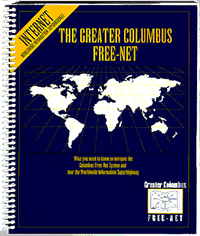ECom-Ohio Assessment Challenges Ohio to be a Leader in the E-commerce Revolution
ECom-Ohio today released its statewide and regional assessments of Ohio's readiness for electronic commerce. At the event, key leaders in government, education and industry unveiled action agendas designed to help Ohio lead in the coming e-commerce revolution. The action agendas require key industry, infrastructure and educational changes to be made at both the state and regional levels.
 An audio version of the Greater Columbus Free-Net User's Guide is now distributed through the Central Ohio Radio Reading Service, Inc. (CORRS). The User's Guide audio version is a set of six audio cassette tapes and is a collaborative effort of
An audio version of the Greater Columbus Free-Net User's Guide is now distributed through the Central Ohio Radio Reading Service, Inc. (CORRS). The User's Guide audio version is a set of six audio cassette tapes and is a collaborative effort of